Special Library for Japanese-Language Education, The Library of the Japan Foundation Japanese-Language Institute, Urawa
- Nihongo Kyoiku News
- This corner introduces the latest information on matters of high interest to overseas Japanese-language educators from among the Japanese-Language Education Programs conducted by the Japan Foundation.
August, 2024
The Japan Foundation Japanese-Language Institute, Urawa
How many readers of Nihongo Kyoiku Tsushin know that there is a specialized Japanese-language education library that anyone can use in the Japan Foundation Japanese-Language Institute, Urawa (hereinafter “NC”, Saitama City, Saitama Prefecture)?
The Library of the Japan Foundation Japanese-Language Institute, Urawa (hereinafter “NC Library”), is the only library in the world specializing in Japanese-language education. We hope that people involved in Japanese-language education and people with any kind of interest in Japanese-language education will take this opportunity to learn about and make use of the NC Library. The second half of this article will also offer hints as to how you can search for Japanese-language studying materials using the library’s Online Public Access Catalog (OPAC), which is available online and can also be used from outside the library.
1. The only library in the world specializing in Japanese-language education
The NC Library was opened in 1989, the same year as NC was established. It is located on NC’s second floor, and has a collection of approximately 50,000 materials. You can see the courtyard very clearly through the library’s large windows, and enjoy the changing seasons.
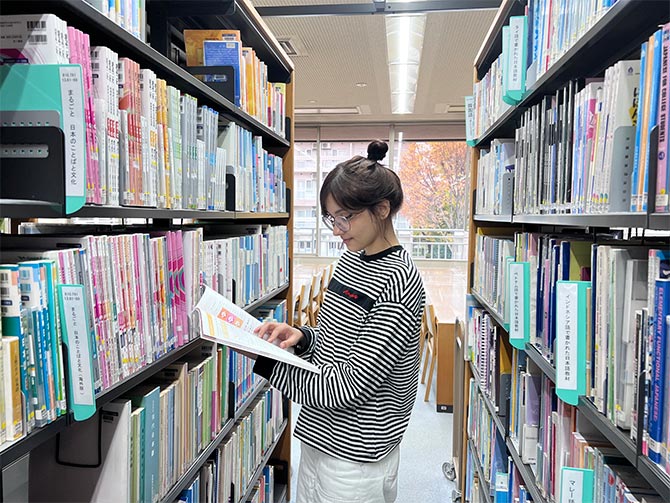
The library collects and provides Japanese-language studying materials from about 80 countries/regions around the world, as well as materials focused on the field of Japanese-language education, such as Japanese linguistics, linguistics, Japan’s current society, and foreign-language education. As a library, this facility’s most unique aspect has to be the quantity of Japanese-language studying materials it has assembled, from Japan and overseas. “This is the first time I’ve seen a place with so many Japanese-language textbooks together. It’s like heaven”—this was the impression of a Japanese-language teacher from overseas who participated in training at NC.
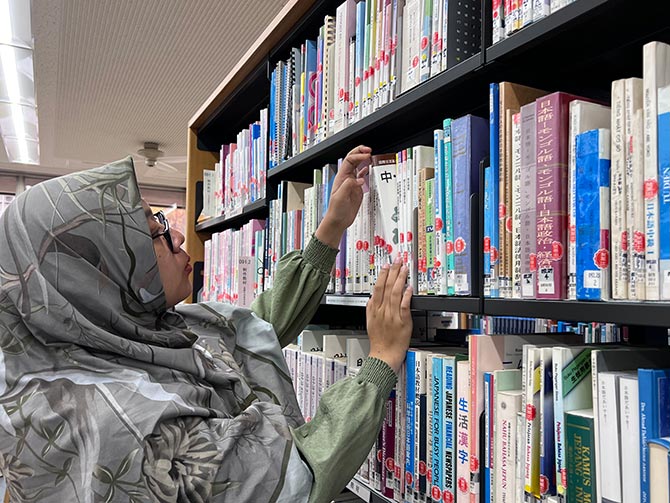
The library has an almost-exhaustive collection of Japanese-language studying materials published in Japan. When materials cannot be purchased in Japan, the library may ask for help from the Japan Foundation (JF) overseas offices to obtain them. There have also been donations of Japanese-language studying materials produced by a variety of organizations and individuals, including publishers and local governments, for which we are extremely grateful. There have even been a considerable number of donations from other countries, meaning the library contains a large number of valuable materials that are not available from any other library in Japan. You can use OPAC to search the materials in its collection Note 1.
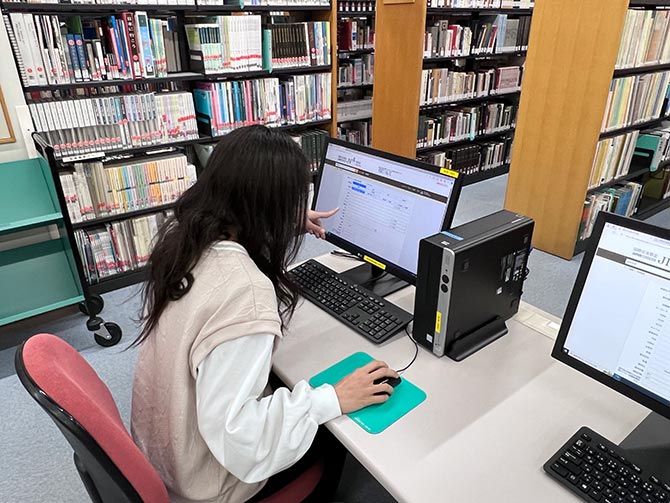
The library is open to the general public, and anyone can view the materials and use the photocopying service. You can register to use the loan service if you are involved in Japanese-language education and either reside in Japan or will be staying in Japan for at least three months from the date of registration. A large number of people who live in the Kanto region are registered to use the service, but the registration requirements do not contain any restrictions regarding where you live in Japan, so there are also people who live a large distance away. In these cases, once they have visited the library to register themselves, they can use the service by returning borrowed materials by postal mail at a later date. The loan service is mainly used by Japanese-language teachers, volunteers teaching Japanese, and students and researchers focusing on Japanese-language education.
The NC Library also offers a literature loan service through public libraries and university libraries in Japan. If it is difficult to visit the NC Library, you can request the use of photocopies of literature and materials in a nearby library (the requested materials should be used within that library). Anyone can use the literature loan service, so please ask at a nearby library if you are interested.
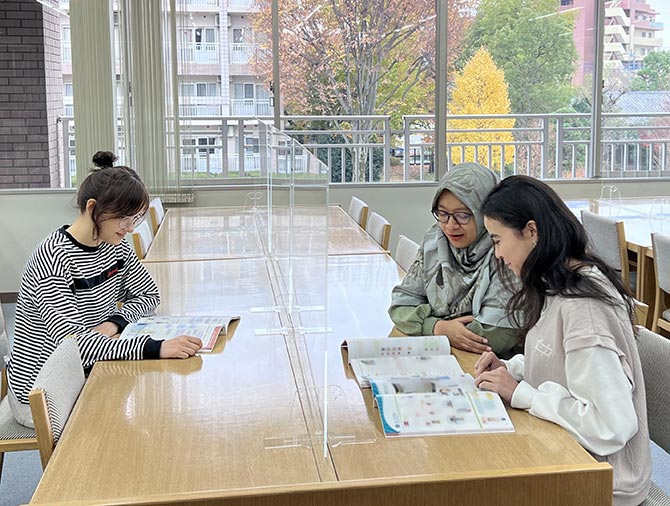
The most common use of the NC library is by Japanese-language teachers who want to compare and consider Japanese-language studying materials for lesson creation and to reference Japanese-language teaching techniques, but it is also used for a variety of other purposes. For example, researchers and students might photocopy papers from academic journals or bulletins relating to Japanese-language education to write their own papers, analyze Japanese-language textbooks published overseas, or investigate changes in the content of Japanese-language studying materials. NC runs teacher training courses for foreign Japanese-language teachers who are invited to Japan, and many of the course participants use the library. The presence of groups visiting to search for materials for course project work and people focused on homework and self-study in their free time after their course gives the library a gentle atmosphere, more like a library affiliated with a university or a school than a specialized library.
2. How to use OPAC to help with Japanese-language education
This section gives four examples based on inquiries made at the library, and introduces ways of using OPAC to search for Japanese-language studying materials.
First, when you use OPAC to search, you probably mostly do so by entering book titles or keywords in the “Search” box on the main page. Here, we’ll explain how to search using the “Advanced Search” function, which allows you to search by combining multiple search items and specifying particular conditions.

Question (1) “Are there any materials I could refer to when teaching pronunciation?”
Answer: By searching with a combination of a “Keyword” and the “Japanese-language studying materials” code through “Advanced Search”, you can search for “Japanese-language studying materials on pronunciation for instructors” that are in the library.
Process 1: Specify “Keyword”
Enter “発音” (pronunciation) in the “Keyword” search box.
Process 2: Select the “Japanese-language studying materials” code
Select [For instructors (The JF Japanese Language Institute, Urawa, Library)] from the “Japanese-language studying materials” pull-down menu, and click [Search].
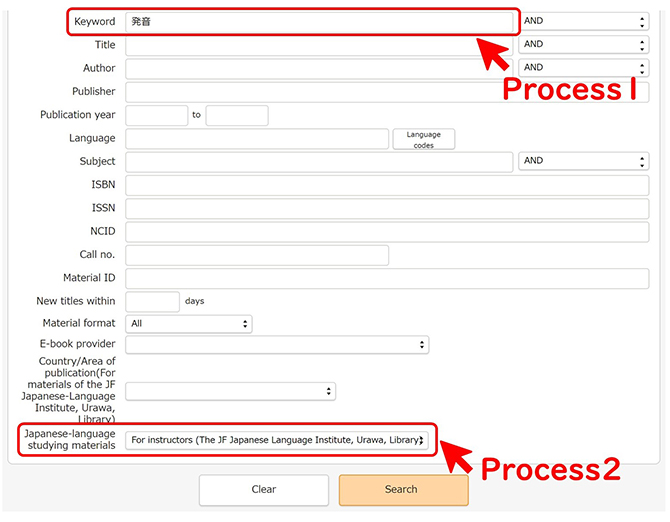
Points to note when searching
We recommend that you use the “Keyword” search box when you want to search for a material with “Advanced Search” based on a theme. The “Keyword” search box can also search for a subject as well as a title. A subject refers to a concise description of the subject of a library material Note 2, so this enables you to search based on the subject of the content of the material rather than a word included in the title. Therefore, if you enter “発音” (pronunciation) in the “Title” search box, there would be no hits for a book called “日本語教師のためのシャドーイング指導”, but if you enter “発音” (pronunciation) in the “Keyword” search box, it matches the subject and the book will be one of the hits.
In addition, when it creates catalog data for materials, the NC library ensures it is possible to differentiate between “Japanese-language studying materials for learners” and “Japanese-language studying materials for instructors” when searching by assigning each their own “Japanese-language studying materials” code. Selecting [For instructors (The JF Japanese Language Institute, Urawa, Library)] from the “Japanese-language studying materials” pull-down menu in “Advanced Search” allows you to search for “Japanese-language studying materials for instructors written about pronunciation”. If you select [For learners (The JF Japanese Language Institute, Urawa, Library)] from the “Japanese-language studying materials” pull-down menu, you can also search for “Japanese-language studying materials for learners written about pronunciation”.
Question (2) “Are there any Japanese-language studying materials written in Thai?”
Answer: Searching with a combination of the “Language” code and the “Japanese-language studying materials” code through “Advanced Search” will enable you to search for the “Japanese-language studying materials written in Thai” in the library.
Process 1: Select the “Language code”
If you click on “Language Codes” to the right of the “Language” search box and then click “T,” it will expand; click “tha Thai タイ語”.
Process 2: Select the “Japanese-language studying materials” code
Select [For learners (The JF Japanese Language Institute, Urawa, Library)] from the “Japanese-language studying materials” pull-down menu, and click “Search”.

Points to note when searching
“Are there Japanese-language studying materials written in XX language?” is one of the most commonly asked questions in the library. You can make similar searches for other languages by changing the “Language codes” you enter in the “Language” search box. You can search by finding and clicking on your target language from the “language codes” in “Advanced Search,” or by directly entering the three-letter language code Note 3.
Question (3) “Are there any Japanese-language studying materials published in Australia?”
Answer: Searching with a combination of the “Country/Area of publication” code and the “Japanese-language studying materials” code through “Advanced Search” will enable you to search for “Japanese-language studying materials published in Australia” in the library.
Process 1: Select “Country/Area of publication”
Select “Australia” from the “Country/Area of publication (For materials of the JF Japanese-Language Institute, Urawa, Library)” pull-down menu.
Process 2: Select the “Japanese-language studying materials” code
Select [For learners (The JF Japanese Language Institute, Urawa, Library)] from the “Japanese-language studying materials” pull-down menu, and click “Search” .
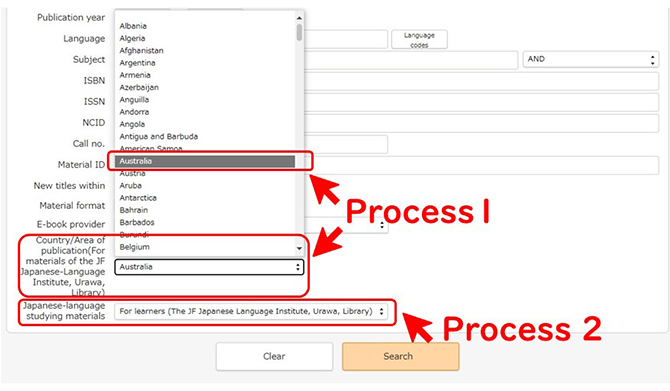
Points to note when searching
People often ask about Japanese-language studying materials by country/region of publication together with inquiries about Japanese-language studying materials by language, as in question (2). You can make similar searches for other countries and regions by changing the code you select in “Country/Area of publication” Note 4.
Question (4): “Are there any Japanese-language studying materials based on ‘The JF Standard for Japanese-Language Education’?”
Answer: You can search for these by entering “JF日本語教育スタンダード活用教材” (Studying materials that use the JF Standard for Japanese-Language Education) in the “Search” box (or in the “Advanced Search” “Keyword” search box).
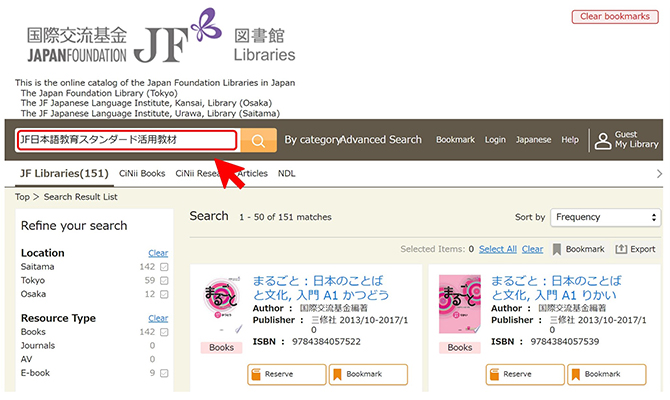
Points to note when searching
When it creates catalog data for materials, the library assigns “JF日本語教育スタンダード活用教材” (Studying materials that use the JF Standard for Japanese-Language Education) as a subject for each, so you can search for studying materials based on the JF Standard for Japanese-Language Education. If you enter “JF日本語教育スタンダード関連資料” (Materials related to the JF Standard for Japanese-Language Education), you can also search for reference materials such as guidebooks for the JF Standard for Japanese-Language Education. If you enter “JF日本語教育スタンダード” (The JF Standard for Japanese-Language Education), you can search for both studying materials and reference materials.
Using the OPAC functions introduced here for searches might help you to find Japanese-language studying materials with a different approach than you have in the past.
3. Finally
The NC Library has continued to collect a variety of Japanese-language studying materials for more than 30 years since it was opened. We hope that, by storing and providing these materials, which we might call assets for the entire world of Japanese-language education, the NC Library can contribute to the development of Japanese-language education in the future. We hope that you will make use of it.
- Notes:
-
- 1.The Library of the Japan Foundation Online Public Access Catalog (OPAC)
This is the library catalog system shared by the three libraries of the Japan Foundation in Japan. Before visiting the library, please check the location of the material you want in the details of the search results and confirm whether it is located in the Japan Foundation Library (Tokyo), the Japanese Language Institute, Kansai, Library (Osaka), and/or the Japanese Language Institute, Urawa, Library (Saitama). The three libraries also have a service that enables you to request materials from each of the other libraries. - 2.Library Terminology Committee, the Japan Library Association (2013) “図書館用語集” Fourth Revised Edition, the Japan Library Association, p76.
- 3.National Institute of Informatics NACSIS-CAT Catalog Information Service “目録システムコーディングマニュアル(CAT2020対応版)付録1.3 言語コード表”
- 4.National Institute of Informatics NACSIS-CAT Catalog Information Service “目録システムコーディングマニュアル(CAT2020対応版)付録1.2 出版国コード表”
The “Country/Area of publication” pull-down menu on OPAC is arranged alphabetically by the two letters of the publishing country/area code.
- 1.The Library of the Japan Foundation Online Public Access Catalog (OPAC)
(AMEMIYA Azusa, Librarian, Japanese Language Institute, Urawa)
- What We Do Top
- Arts and Cultural Exchange [Culture]
- Japanese-Language Education Overseas [Language]
- Japanese-Language Education Overseas [Language] Top
- Learn Japanese-language
- Teach Japanese-language
- Take Japanese-Language Test
- Know about Japanese-language education abroad
- The Japanese-Language Institute, Urawa
- The Japanese-Language Institute, Kansai
- Japanese-Language Programs for Foreign Specified Skilled Worker Candidates
- Japanese Language Education for Japanese Children Resident Overseas and for the Descendants of Migrants
- Archives
- Japanese Studies and Global Partnerships [Dialogue]
- JF digital collection
- Other Programs / Programs to Commemorate Exchange Year
- Awards and Prizes
- Publications
